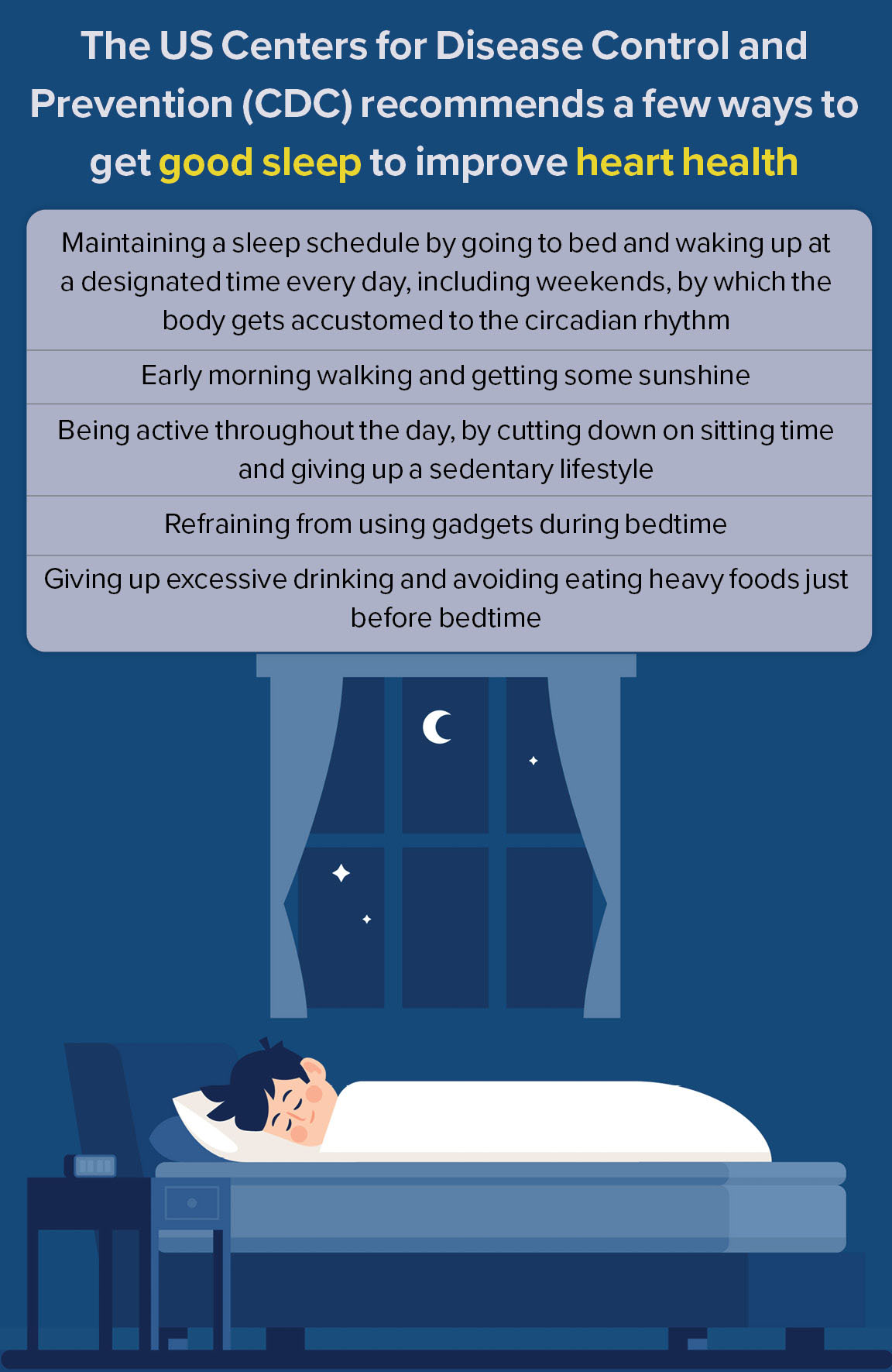
In June 2022, the American Heart Association added sleep as an essential factor for optimal cardiovascular health. According to the new sleep metric, 7-9 hours of daily sleep time is helpful/beneficial for cardiovascular health in adults, and more for children depending on age. The other health and lifestyle factors in the checklist are nicotine exposure, physical activity, diet, weight, blood glucose, cholesterol, and blood pressure.
“The new metric of sleep duration reflects the latest research findings: sleep impacts overall health, and people who have healthier sleep patterns manage health factors such as weight, blood pressure, or risk for type 2 diabetes more effectively,” said the American Heart Association president Donald M. Lloyd-Jones, who led the advisory writing group and is chair of the department of preventive medicine, in a press statement during the announcement.
Now called ‘Life’s Essential 8’, the latest addition – “sleep duration” – is said to be a key parameter in maintaining a healthy heart. Measured by average hours of sleep per night, the ideal level is found to be 7-9 hours daily for adults. Ideal daily sleep ranges for children are 10-16 hours per 24 hours for ages 5 and younger; 9-12 hours for ages 6-12 years; and 8-10 hours for ages 13-18 years.
“As a sleep researcher and training clinician in behavioural sleep medicine, I am beyond elated about the recent addition of sleep health by the American Heart Association to their components of cardiovascular health, which evolved the previous ‘Life’s Simple 7’ to ‘Life’s Essential 8’,” Jesse Cook, MS, clinical psychology PhD student at the University of Wisconsin-Madison told Happiest Health. “Now, it is important to point out that the original determination of ‘Life’s Simply 7’ in 2010 did not overlook sleep health per se, but rather its omission was largely due to the challenges associated with measurement of sleep health that could be quantified into a point scale for use in the construction of a cardiovascular health profile. Improved ease and access to sleep health measures, such as sleep duration, have afforded the ability to add this domain to the components of cardiovascular health.”
He said that it is critical to point out that the sleep health component strictly focuses on sleep duration, both too little and too much, even though this is only one factor of sleep health, which is a multidimensional construct that expands beyond duration to include other characteristics such as the regularity of sleep-wake schedules, quality of sleep and continuity of sleep.
“Although the American Heart Association recognized that these aspects of sleep health are also influential on cardiovascular health, these features can be more difficult to reliably and accurately measure and may not have clearly defined guidelines for health. As such, it is likely that future updates from the American Heart Association will integrate these components of sleep health in their cardiovascular-related sleep health construct, but future technological advancements, as well as more precise guidelines and definitions across these additional sleep health characteristics, are necessary,” said Cook.
Dr Rajpal Singh, Director and Interventional Cardiologist, Fortis Hospital, Bengaluru, told Happiest Health, “A good 7-9 hours of timely, uninterrupted sleep has scientifically shown to reduce the prevalence of hypertension, cerebrovascular events, and cardiac complications.”
However, slumber alone is not enough to keep your heart happy and healthy. Including a regular fitness regime and making appropriate lifestyle changes, i.e., alcohol in moderation, smoking cessation and dietary changes, could have a positive and meaningful clinical impact,” he added.
“Even stress-induced sleeplessness, poor sleep, and bad sleep habits could make one prone to high blood pressure, heart attacks and strokes,” said Dr Jagdish Hiremath, Interventional Cardiologist and Chairman of Aasra hospital. He further cautioned that a person should not go into a sleep debt. “Your body keeps a count of how much sleep it lacks,” explained the doctor.
Sleep and heart connection
So why is sleep so important for the heart? Sleep gives your heart and vascular system the much-needed rest. During non-rapid eye movement (REM) sleep, the heart rate and blood pressure are progressively low as you enter deeper sleep. During REM sleep, in response to dreams, your heart and breathing rates could rise and fall and your blood pressure could also vary.
According to Your Guide to Healthy Sleep, a book published by the US Department of Health and Human Services, National Institutes of Health, and National Heart Lung and Blood Institute, “These changes throughout the night in blood pressure and heart and breathing rates seem to promote cardiovascular health. If you don’t get enough sleep, the nightly dip in blood pressure that appears to be important for good cardiovascular health may not occur. Failure to experience the normal dip in blood pressure during sleep can be related to insufficient sleep time, an untreated sleep disorder (for example, sleep apnoea), or other factors. Some sleep-related abnormalities may be markers of heart disease and increased risk of stroke.”
In addition, snoring is said to increase the risk of developing diabetes and heart disease. Experts say that regular snoring may raise the lifetime risk of developing high blood pressure, heart failure, and stroke.
Assessment by sleep doctors is a must
Dr Pavan Yadav, Lead Consultant-Interventional Pulmonology and Sleep Medicine, Aster RV hospital, Bengaluru, told Happiest Health, “The research to establish the correlation between sleep and heart health was going on for last few years, and finally sleep has now been added to the heart health checklist. It is definitely a vital factor to be considered. Anything to do with a heart attack or arrhythmia could result out of sleep issues a person may be having.”
Commenting on how sleep deprivation can affect the heart, the doctor elaborated, “The heart is like a pump. If there is an obstruction, an issue is likely to crop up. Hence, sleep obstructions and disorders can lead to complications of the heart and increase the risk of abnormal heart rhythms, which can lower blood pressure.”

A lot relies on sleep
“If you see the Western population, obesity is on the rise, which is causing an uptick in heart ailments. This again leads to sleep issues. If we look at the science behind this, we’ll see that low oxygen level disrupts sleep, and sleep disorders like sleep apnoea are increasing as well. When the oxygen level in the body drops, the heart is affected in turn,” Dr Yadav added. This happens because humans ideally sleep for 8 hours a day, which amounts to 1/3rd of our day spent sleeping. When low oxygen pressure is created during this duration, the pressure on the heart gradually increases, reasoned the doctor.
“Nowadays, cardiologists are referring persons with cardiac disorder and uncontrolled diabetes to me to assess if they have any underlying sleep issues. To get to the root of the problem, we undertake clinical assessments in multiple ways and investigate if they snore and whether they feel refreshed or tired in the morning after waking up from sleep. We also assess daytime sleeping, their consumption of coffee and tea, and whether they are putting on weight. We also do an overnight sleep study where we check a person’s heart rate and oxygen levels by connecting multiple electrodes to examine their sleep patterns,” Dr Yadav pointed out.
During such assessments, pulmonologists also monitor how the oxygen levels of the patient function. Dr Yadav said that there are people who have 98-99 per cent of oxygen saturation (SpO2), determining the percentage of oxygen in someone’s blood, and in some people the SpO2 dips to 40-60 per cent, which becomes a critical value for assessing heart risks.
Sleep conditions that affect heart health
During normal sleep, blood pressure stays low. Those who face sleep problems tend to have a higher blood pressure, which directly affects the heart and is a reason to develop heart-related ailments and problems.
- Sleep apnea and heart disease – This occurs when the airways are blocked repeatedly during sleep, leading to difficulty in breathing for short amounts of time. Sleep apnea heart disease affects how much oxygen a body gets while sleeping and increases heart-related problems.
- Insomnia – This is a condition where there is trouble falling asleep, staying asleep or both. Insomnia is linked to high blood pressure and heart disease. Prolonged and frequent episodes of insomnia can lead to heart health issues, including higher stress levels, lack of motivation, lower energy and unhealthy food choices.
- Narcolepsy– A review study said that even people battling narcolepsy often present with comorbidities like obesity, diabetes, depression, and other sleep disorders that may also contribute to increased cardiovascular risk.
- Circadian Rhythm Disorders– The 24-hours body clock called the circadian rhythm can also affect your heart. A study looked into how Circadian misalignment, typically experienced by shift workers and individuals who experience late eating, jet lag, or rhythm disturbances, can increase cardiovascular risk factors.

















